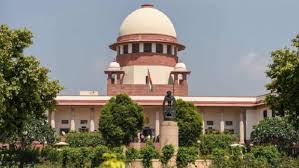NEW DELHI: The Supreme Court on Monday agreed to consider setting up a Constitution Bench to hear petitions challenging the validity of passage of laws such as the Aadhaar Act as money Bills, allegedly to bypass the Rajya Sabha.
Senior advocate Kapil Sibal told a Bench led by Chief Justice of India DY Chandrachud that the procedural formalities regarding filing of documents were complete and the petitions needed to be listed for hearing.
“I will take the call when I form the Constitution Benches,” the CJI told Sibal.
Earlier, the top court had said it would constitute a seven-judge Constitution Bench to consider the issue of validity of passage of laws as Money Bills.
The decision was aimed at addressing the controversy around Money Bills after the government introduced laws like the Aadhaar Act and even amendments to the Prevention of Money Laundering Act (PMLA) as Money Bills, apparently to circumvent the Rajya Sabha where it did not have a majority then.
A Bill is said to be a Money Bill if it only contains provisions on taxation, borrowing of money by the government, expenditure from or receipt to the Consolidated Fund of India. Bills that only contain provisions that are incidental to these matters would also be regarded as Money Bills. They can only be introduced in the Lok Sabha. The Rajya Sabha can only suggest amendments to Money Bills but its suggestions aren’t binding on the Lok Sabha. A Money Bill is required to be certified as such by the Speaker before being introduced in the Lok Sabha.
In November 2019, a five-judge Constitution Bench had said the validity of passage of Finance Bill 2017 as Money Bill should be decided by a larger Bench.
The 2019 decision had come on petitions on the functioning of tribunals which also challenged the Finance Act 2017 that attempted to revamp the functioning of tribunals.
As the suggestions made by the Rajya Sabha on the Bill passed in the Lok Sabha were ignored, the petitioners contended that the passage of the Finance Bill in the form of a Money Bill was entirely inappropriate and amounted to a fraud on the Constitution.
The decision regarding the passage of the Aadhaar Act as Money Bill in 2016 had been upheld by a five-Judge Bench of the Supreme Court in 2018. Justice Chandrachud had delivered a dissenting verdict and said Aadhaar law could not have been passed as a Money Bill.


